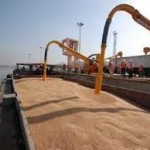By Rudy Ruitenberg
Bloomberg – Novembre 21, 2012

Morocco’s grain imports are set to jump 35 percent to a record in the 2013-13 season after cold weather and a drought curbed local wheat and barley production, the UN’s Food & Agriculture Organization said.Purchases may climb to 8.41 million metric tons from 6.24 million tons in 2011-12, the Rome-based United Nations agency wrote in an online report dated yesterday. Imports will include 5.2 million tons of wheat, the FAO said.Morocco will overtake Algeria as Africa’s second-largest wheat buyer behind Egypt in the 2012-13 season, the International Grains Council predicts. Morocco is food-deficient and imports grain to meet consumption needs even in good years, according to the FAO.“Wheat constitutes the bulk of the imports,” the FAO wrote. “France and Canada are likely to re-emerge as dominant sellers of wheat to Morocco following difficulties with export supplies in the Black Sea region.”The African country’s farmers harvested 3.87 million tons of wheat this year, falling 36 percent from 6.02 million tons in 2011, the report showed. Late sowing and a cold spell in early 2012 followed by drought conditions hurt output, the FAO said.Morocco’s barley crop slid 49 percent to 1.2 million tons from 2.34 million tons, the UN agency said.Farmers are now planting winter wheat and barley for harvesting from May, and the agriculture ministry expects the total grain area to be similar to the previous season at 5 million hectares (12.4 million acres), the FAO said.Above-average rain, while hampering some field work, “significantly” improved soil moisture, in turn encouraging early planting, according to the report.Steps taken by the government to boost crop yields include providing certified seeds for as little as 40 percent of cost, the FAO said. The state subsidizes soil testing and as much as 70 percent of purchase prices for farm machinery and irrigation equipment, it said.Morocco is also subsidizing crop insurance premiums, with the insured area predicted to climb to 500,000 hectares from 300,000 hectares this year, the report showed.“In spite of the country’s high import dependency rate, the impact of the changes in international prices on domestic prices was mitigated by government interventions,” the FAO wrote. “The current poor production is exerting some upward pressure on food prices.”The government has said the price of a 200-gram (7-ounce) loaf of bread should stay at 1.2 dirhams ($0.14), according to the report.The Moroccan orange harvest is expected to drop 25 percent this year as date production rises 10 percent from the five-year average, the FAO said.To contact the reporter on this story: Rudy Ruitenberg in Paris atrruitenberg@bloomberg.netTo contact the editor responsible for this story: Claudia Carpenter atccarpenter2@bloomberg.net







